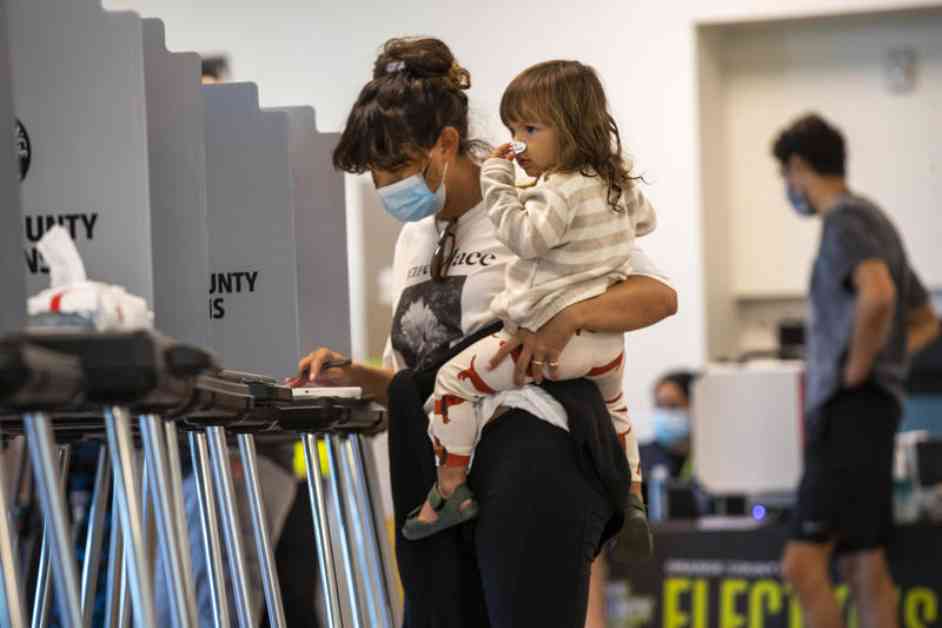The Importance of Early Civic Engagement: Empowering Future Generations through Voting
In a heartwarming scene captured in Newport Beach in 2020, 2-year-old Billie Montague playfully stuck a vote sticker on her nose while watching her mother, Ashley Montague, cast her ballot. This seemingly simple act holds profound significance – it represents the vital role children play in shaping our collective future through informed civic values and active community involvement.
Children are not just bystanders in the voting process; they are capable participants who can be introduced to the democratic system from a young age. By nurturing their sense of civic responsibility as early as 5 or 6 years old, we can ignite their curiosity about how individual actions impact the broader community, laying the foundation for a generation of informed, engaged citizens.
Barriers to Access and Participation
In my work focusing on diversity, equity, and inclusion, I often grapple with the challenges of misinformation, access barriers, and participation roadblocks that hinder voter engagement. Unfortunately, voting processes are susceptible to misinformation campaigns that target marginalized communities, including Black, Latino, disabled, rural residents, and the elderly. Child care access issues, for instance, can indirectly suppress voter turnout, especially for parents who struggle to find affordable child care, particularly in underserved areas.
These barriers are exacerbated in regions with limited polling locations, long wait times, or scarce resources for early or mail-in voting. For parents juggling responsibilities, misinformation around voting options can further deter them from participating in the electoral process. Empowering parents with accurate information and expanding access to voting resources are critical steps in ensuring inclusive civic participation for all.
Fostering Civic Engagement in the Next Generation
As we look towards the future, it’s crucial to recognize the growing significance of civic engagement among Generation Z, who are poised to become a formidable force in upcoming elections. With millions of Gen Z youth set to join the electorate, efforts to expand access and participation are more vital than ever. Civic engagement is not just a right but a responsibility that impacts us all, shaping the trajectory of our society.
Political socialization, the process through which individuals develop political beliefs and values, is a key component of fostering civic engagement in children. While parents traditionally influence their children’s political views, research suggests that children’s awareness of civic issues can also shape their parents’ perspectives in a phenomenon known as “trickle-up socialization.” By involving children in the voting process, we provide them with a hands-on experience of democracy, sparking meaningful conversations and fostering family engagement.
The decline in civic knowledge among Americans is a cause for concern, with many lacking a basic understanding of government structures and constitutional rights. Initiatives like the annual Annenberg study shed light on these gaps, revealing the need for enhanced civic education and engagement across all age groups.
As parents, we hold the power to inspire an informed and engaged generation of citizens. If you haven’t already, consider creating a family voting plan for the upcoming elections. In California, minors under 18 are allowed to accompany a guardian to the polls, providing a valuable opportunity to educate them about the electoral process. Utilize resources from the Secretary of State, nonprofits, and local media to engage children in discussions about democracy, justice, and community decision-making.
Voting with kids is not just a privilege; it’s a purposeful act that lays the groundwork for a future generation of active, informed citizens. Let’s empower our children to become the changemakers of tomorrow, starting with a trip to the voting booth today.
Amira K.S. Barger, MBA, CVA, CFRE, is a seasoned diversity, equity, and inclusion consultant and an adjunct professor at California State University, East Bay. Her insights shed light on the transformative power of early civic engagement and the critical role children play in shaping our democracy.




















